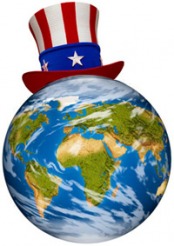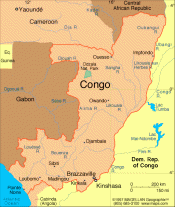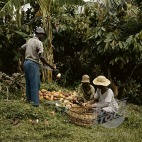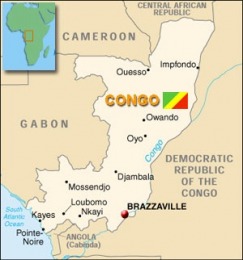Imperialism

Imperialism is the policy of forcefully extending a nation's authority by territorial gain or by the establishment of economic and political dominance over other nations. The basic idea of imperialism is when larger and stronger nations dominate smaller and weaker nations. Great Britain played a major in the period of imperialism conqering many nations of africa and using their(africa) geography and natural resources to their(Great Britain) advantage.
Congo & It's Natural Resources

The Congo is situated in west-central Africa astride the equator. It borders Gabon, Cameroon, the Central African Republic, the Democratic Republic of the Congo, and the Angola exclave of Cabinda, with a short stretch of coast on the South Atlantic. Its area is nearly three times that of Pennsylvania. Most of the inland is tropical rain forest, drained by tributaries of the Congo River. Some natural resources found in congo are petroleum, timber, potash, lead, zinc, uranium, copper, phosphates, gold, magnesium, and hydropower.
Agriculture

Cassava, bananas, corn, sweet potatoes, peanuts, beans and taro are some agricultural products produced in Congo. In addition, Congo also depended on cash crops. Cofee, cocao, urena, bananas and palm oil are some cash crops of the country of Congo.
Languages
There are sixty-eight languages are still spoken in the Congo. These languages are classified into four families: Nilo-Saharan, Adamawan, Bantu, and Oubanguian. Many people speak more than one language. Swahili, Hausa, Arabic, and Sango also are widely used. After colonization, people began to communicate in Sango, which some believe emerged when the diverse Africans who were brought in by the Europeans (as militia, workers, and servants) interacted with the inhabitants of the upper Ubangi River. Its use was encouraged by the French but shunned by missionaries until Protestant missionaries and, later, Roman Catholics, began using it in the 1920s. Converts accepted Sango along with the religion, and Christianity helped to spread the language. Written material in Sango was first published by Protestants. Since independence, spoken Sango has become almost universal except among the Mbororo near the Chadian border. In Bangui, Sango is the most frequently used language, even in households where an ethnic language is traditional. In 1996, Sango was declared co-official with French, which is used to communicate with the rest of the world. Sango remains primarily a spoken language, while French is used in written communications, particularly in government and education.
Colonization

The country of Congo was colonized by The British. The reason the British colonized Congo is because they felt that it was their duty to bring new found progress and civilization to the "uncivilized" in the world.
Control

The Europeans took control of Congo by holding a conference called "The Berlin Conference". The Europeans held fourteen representatives from European nations who were involved in the new competition for territory. The African rulers did not attend the conference and also had no say in the foreign control.
The people's reaction towards European rule
The African people did not want to be ruled by the British. They were satisfied with their way of life and did not want it to be altered. This reason being many Africans rebelled/protested against the European rule. They did this by assembling resistance movements. Unfortunately thousand of africans lost their lives in those movements
Negative & Positive Effects of Colonial Rule
There were many negative and positive effects of colonial rule in the nation of Congo. Some negative effects that colonial rule had on Congo, are that the people (Africans) lost control of their land, traditional cultures broken due to having to adapt to the European way of life, and many died due to new diseases and resistance movements. Positive effects that colonial rule had on the country of Congo is that the literacy improved, lifespans were increased, and schools and hospitals were provided.
